First, Dr. Abara highlighted the importance of meeting a community need utilizing technology, rather than letting available technology drive assessment of needs. He suggested that the goals of a telemedicine program should be clear, well-research, evidence-based, and consensus-built; improve access to care; reduce costs associated with long-distance travel; and reduce professional isolation by providing a supportive network of professionals. He highlighted the importance of a needs assessment and identification of relevant resources and colleagues and infrastructure. Further, he emphasized the importance of periodic evaluation to allow for accountability, quality improvement, and research.
In the context of medical education, telemedicine provides unique opportunities and hurdles. In particular, these approaches may change the learner – educator relationship. However, international learning programs and collaborations may allow for much wider exposure as a result of the use of telemedicine approaches. To this end, he highlighted his experience with the Northern Ontario School of Medicine. Virtual health has facilitated distributed medical education at this institution. This has been applied in undergraduate and postgraduate medical education.
Furthermore, telementoring offers, in Dr. Abara’s perspective, a wealth of opportunities to expand exposure and engagement.
In the realm of clinical care, he suggested that nearly all non-emergent aspects of urologic practice may be undertaken using a virtual approach. In particular, leveraging radiology and home care for urologic conditions has already occurred and future developments in digital health will continue to enrich the clinical interaction.
Despite this promise, he highlighted a number of challenges including human resources, financial resources, infrastructure, a lack of education, and a lack of technology. However, he emphasized that there are many opportunities that remain to be realized.
Presented by: Emmanuel O. Abara, MD, FRCS, FACS, FICS, Director, Richmond Hill Urology Practice & Prostate Institute, Richmond Hill, Ontario, Canada
Written by: Christopher J.D. Wallis, MD, PhD, Urologic Oncology Fellow, Vanderbilt University Medical Center, Nashville, Tennessee, Twitter: @WallisCJD at the 2020 Société Internationale d'Urologie Virtual Congress (#SIU2020), October 10th - October 11th, 2020


